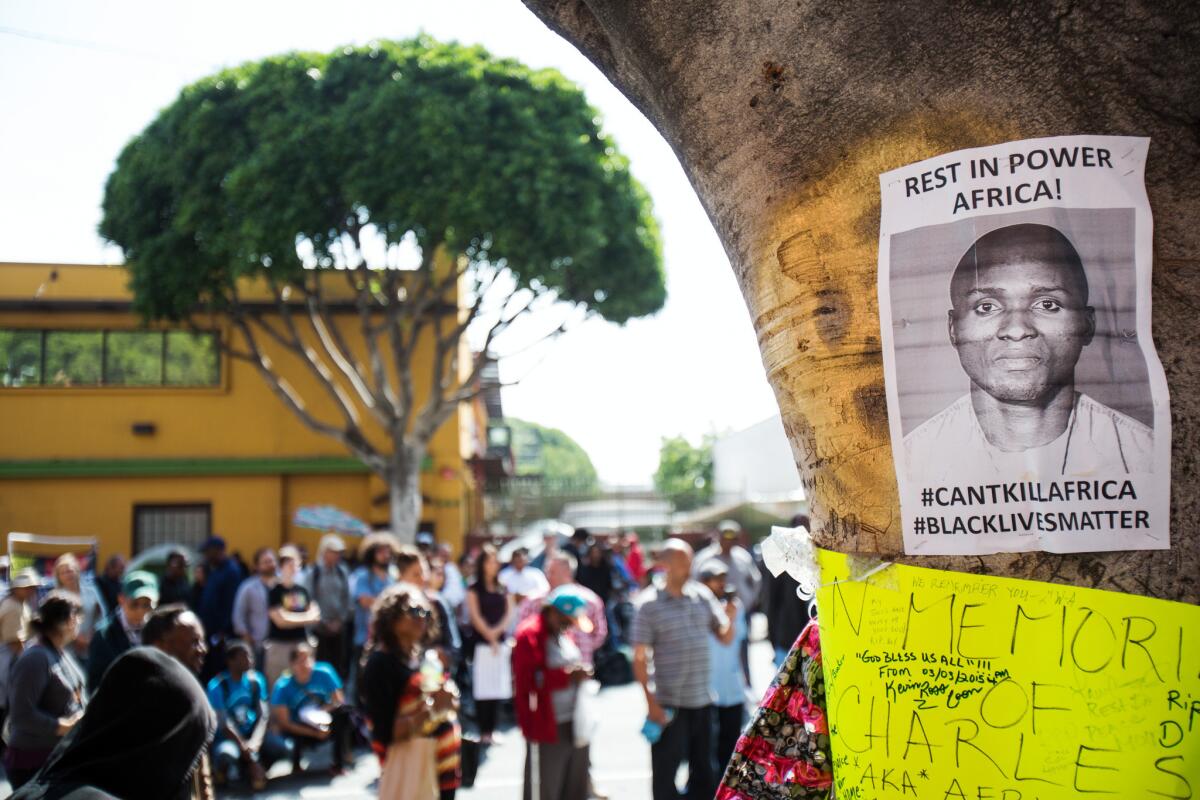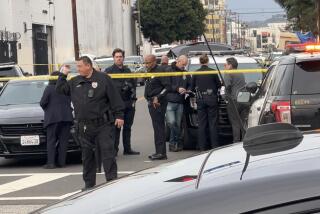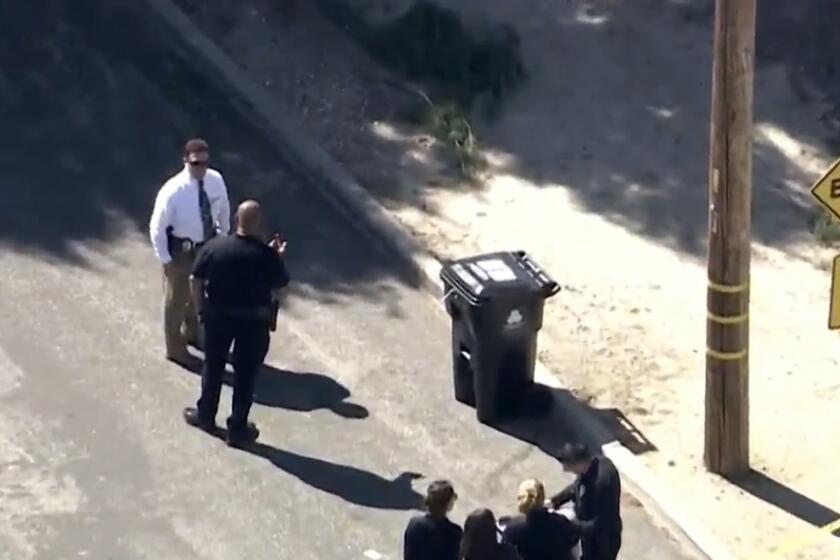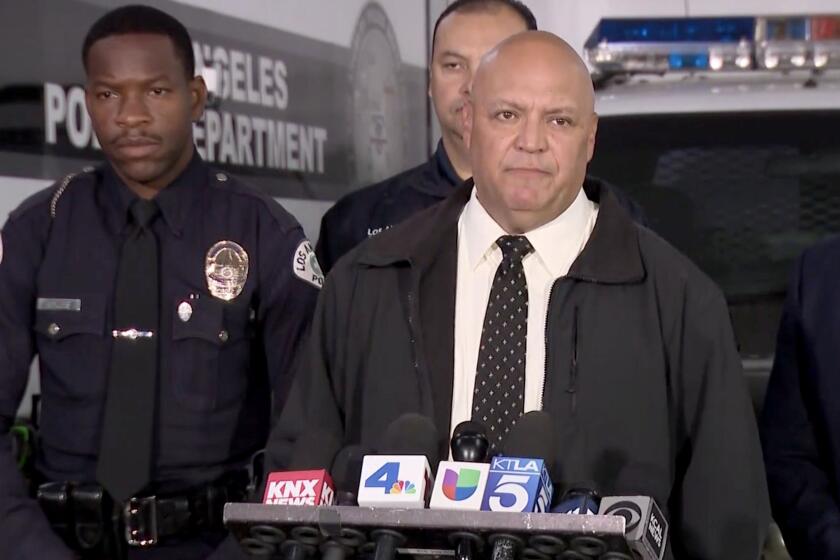Man killed by police on L.A.’s skid row had studied physics, wanted to be actor

Heleine Tchayou was watching television in her Malden, Mass., home when video appeared of Los Angeles police shooting and killing an unarmed, homeless man on skid row.
It wasn’t until his photograph was released that Tchayou realized the man who lay dying on the pavement 2,900 miles away was her son, a family friend said.
Charly Leundeu Keunang, 43, had been a man without a home, a country or even a real name. His story seemed preposterous: A Cameroonian national, would-be actor and convicted bank robber, he stole a Frenchman’s identity and did time under his name in a U.S. prison psychiatric facility.
The March 1 shooting prompted furious criticism of the Los Angeles Police Department and calls for better training for officers who deal with skid row’s mentally unstable population.
It also revealed gaps in probation supervision and underscored how skid row remains a minefield for police and homeless people — a destination of last resort for former offenders, the mentally ill and others who have lost their way.
“We’re releasing the most troubled people you can imagine to the meanest streets,” said the Rev. Andy Bales, head of Union Rescue Mission.
“It’s so much easier to point fingers than to recognize the entire network is broken,” said Christine Sigurdson, a retired psychiatrist who evaluated Keunang in prison.
Keunang, one of Tchayou’s two children, was several courses short of the equivalent of a bachelor’s degree in mathematics and physics when he moved to the U.S. to break into Hollywood.
“Charly was a very bright student,”’ said David Singui, a Los Angeles businessman who is acting as the Tchayou family spokesman. “Life is very difficult in Cameroon for young people. There are no jobs.”
Arriving in Los Angeles in 1997 on a stolen passport, Keunang posed as Charley Saturmin Robinet while living with friends on Wilcox Avenue in Hollywood. He later told the FBI he worked as a personal trainer.
Keunang kept fit and did not use alcohol or drugs, Marcus Timmons, who was also convicted in the heist, said in an interview. Keunang played up the “French” angle and was popular with women, he added.
“He could have made it,” said Timmons, adding that Keunang’s Robert De Niro and Al Pacino impersonations showed talent.
Keunang had no criminal record when a neighbor proposed in 2000 that they rob a Wells Fargo Bank, court records show.
After his capture, Keunang confessed, telling the FBI he owed money to his acting studio, the Beverly Hills Playhouse, which counts George Clooney and Jim Carrey among its alumni.
The neighbor, Edward Johnson, told him, “To rob a bank is just like any acting,” Keunang told the FBI, according to court records. (Johnson was convicted in connection with the robbery.)
“I could tell he’d never been in the criminal element,” Timmons said.
Dressed in blue overalls, ski masks and gloves — “to not leave fingerprints,” Keunang said — the three men drove a rented Dodge Neon to a Thousand Oaks bank branch. Timmons said he began to suspect Keunang was delusional when he argued with Johnson in the car over candy.
“Charly said he couldn’t rob a bank without having chocolate first,” Timmons said.
Keunang jumped the counter and hit the teller in the head with his unloaded pistol, which was not in the plan.
“It was like something he saw on TV,” Timmons said. “I think for him it was all make-believe.”
After a 30-mile chase, the getaway car, a Lincoln Navigator, was stopped by a California Highway Patrol spike strip. Keunang had $30,000 stuffed in his underwear, prosecutors said.
He later recanted his confession and insisted on going to trial, his defense lawyer said.
“I told him it would be a blood bath, but he wouldn’t listen,” attorney Stephen Cron said.
Keunang implored the FBI not to notify his family.
“Charly didn’t want anybody to know,” Singui said. “Going to jail in our country comes with great shame.”
He was sentenced to 15 years in federal prison. Timmons said Keunang was in rough shape when he last saw him before reporting to prison years ago in a federal lockup in downtown Los Angeles, refusing to bathe or get out of bed.
“His cellmate threatened to beat him up,” Timmons said. “A part of him got lost. “
In 2003, still living as Charley Robinet, he was placed in the mental health unit at the federal correctional center in Rochester, Minn. He was not considered dangerous. Two years later, citing a “mental defect or disease,” the government asked the court to commit him to the psychiatric hospital’s inpatient ward, court records show.
“With no family, no community support, I’m sure he got depressed,” Singui said.
Keunang was released in 2013 to immigration authorities, but neither France nor Cameroon would take him. Under a 2001 U.S. Supreme Court ruling, officials had only 60 days to deport him.
Noting that he had no options for shelter, Keunang’s probation officer asked U.S. District Judge Christina Snyder to send him to a federal halfway house.
The program at Vinewood, a 70-bed complex in East Hollywood contracted with through the Bureau of Prisons, includes literacy and vocational training, life-skills instruction and anger and stress management but not mental health treatment, according to its website.
He was released in May 2014 under the supervision of federal probation for at least three years, and reunited with his family on the East Coast.
“He spent time with them. It was a big family reunion,” Singui said, adding that he gave no sign of mental illness. Keunang stayed in close contact with his sister, who gave him money, Singui said.
(Keunang’s mother and sister declined to be interviewed.)
Skid row residents said he showed up six or seven months ago, first at the Los Angeles Mission, then outside the Union Rescue Mission, where he pitched a tent next to an outdoor toilet.
Everyone called him “Africa” or “Cameroon.” Some remembered him as quiet, respectful and deeply religious, but others said he isolated himself in deep depression, or was confrontational and prone to irrational outbursts.
“He was paranoid of police,” recalled Kelly Kunta, a skid row resident. “We all are. He would see police way down the block not doing anything and turn around and be gone.”
The family thought he was staying with a friend in Canoga Park and working on his immigration status. Officials said he kept all his Immigration and Customs Enforcement appointments.
“He was determined to go back to Cameroon,” Singui said.
But in November he quit reporting to his probation officer, who is based in an office building in Woodland Hills, 1 1/2 hours by bus from skid row, that also houses the Department of Homeland Security. The U.S. Marshals Service issued an arrest warrant in January.
It was unclear whether probation officials knew where he was or tried to find him. Chief U.S. Probation Officer Michelle A. Carey declined to answer questions, saying in a letter: “The information you are seeking is not publicly available.”
Police said officers with the Safer Cities Initiative, a skid row task force, went to Keunang’s tent about noon that Sunday in response to a 911 call. He was shot during a frantic struggle with five officers.
The officials said he grabbed an officer’s holstered gun. Several witnesses disputed the account, and the video was inconclusive.
Police officials first identified him as Robinet, but after French authorities spoke out, the coroner’s office released his real name. Family members had Keunang’s body taken to a local mortuary and want a private autopsy and a lawsuit, Singui said.
A funeral in Los Angeles with Cameroonian customs, including an all-night wake, is slated for April. If the community can raise the money, Keunang will be sent back to Cameroon for burial.
Twitter: @geholland
More to Read
Start your day right
Sign up for Essential California for news, features and recommendations from the L.A. Times and beyond in your inbox six days a week.
You may occasionally receive promotional content from the Los Angeles Times.







